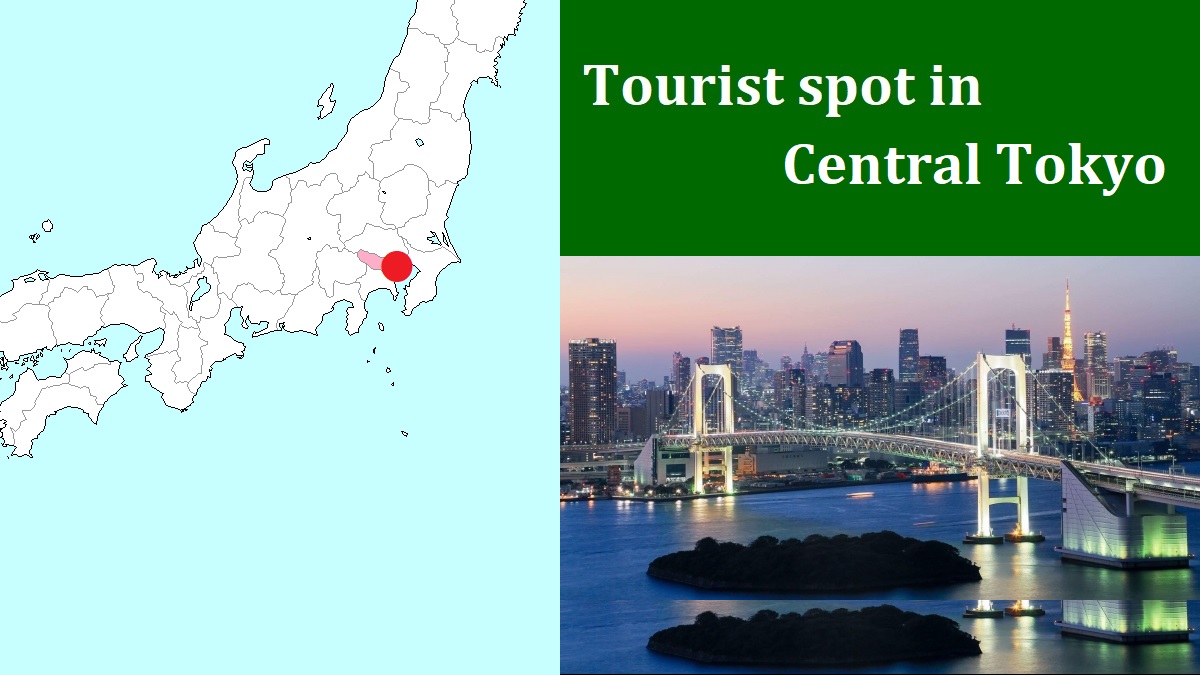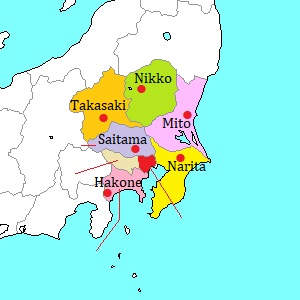Ueno [上野]
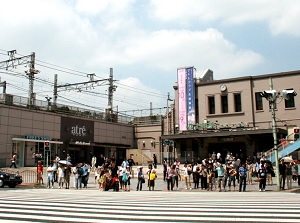
Ueno Station
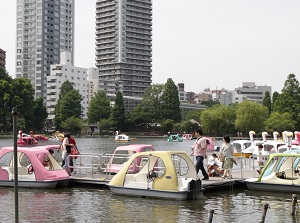
Boat Pond in Ueno Park
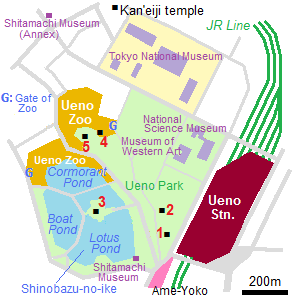
1) Statue of Takamori Saigo
2) Kiyomizu Kan-nondo 3) Bentendo
4) Five-story pagoda 5) Ueno Toshogu
Ueno is the area located about 4 km north of Tokyo station.
There is Ueno station in the center of the area, and Ueno park is spread in the west side of the station.
Ueno station (上野駅) is one of main stations in Tokyo.
It is a big station along with Tokyo station, and had been the terminal station that a lot of trains bound for the north Japan departed and arrived until the 1990s.
Therefore, this station has many platforms and the area of the station is wide.
Now, main lines have been connected between Tokyo and Ueno, and Ueno became a big intermediate station.
Ueno Park
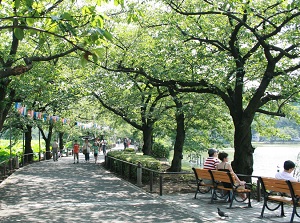
Ueno Park
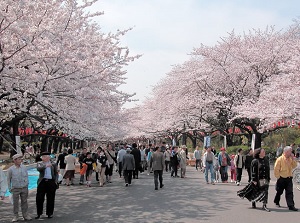
Cherry blossoms in Ueno Park
Ueno Park (上野公園) is a park located just west of Ueno station.
The park is about 1 km from east to west and about 1.3 km from north to south, and has an area of 53 hectares.
In the early 17th century, whole area of this park was the precincts of Kan-eiji temple (寛永寺), which has been the temple of Tokugawa family (The Shogun of Edo government).
Current temple is at just north of current park.
The temple had been burnt down by the civil war in 1868, then it had been the park in 1873.
So some buildings of former Kan-eiji remain in the park.
There are some tourist spots in this park.
Especially, this park is the most popular cherry blossom viewing spot in Tokyo, and there are about 1,200 cherry trees in this park.
Statue of Saigo Takamori (西郷隆盛像)
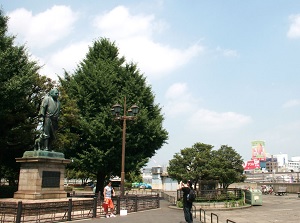
Statue of Takamori Saigo in the park
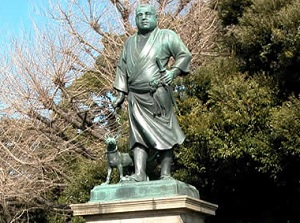
Statue of Takamori Saigo
It is a bronze statue of Saigo Takamori (1828-1877) with his dog.
It is located near southeast entrance of the park.
Saigo Takamori was one of the samurais who had overthrown the feudal Edo government, then he was active as an important politician in the new Meiji government.
The statue was created by Takamura Kôun (1852-1934, an eminent Japanese sculptor) in 1898.
Many Japanese people know this statue as the symbol of Ueno.
Shinobazu-no-ike (不忍池)
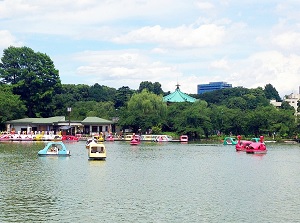
Shinobazu-no-ike
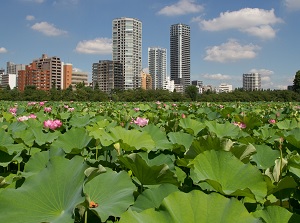
Lotus Pond in Shinobazu-no-ike
Shinobazu-no-ike ("Shinobazu Pond" in English) is a natural pond occupying the southwest half of this park, and has a circumference of about 2 km.
A few dikes for promenading have been created in the pond, and Bentendo temple stands on an island.
These separate the pond into three parts.
The west part is "Boat Pond" for rental boat.
The south part is "Lotus Pond" where lotuses grow thick.
And, the north part is "Cormorant Pond" where cormorants live and it is in a part of Ueno Zoo.
Ueno Zoo (上野動物園)
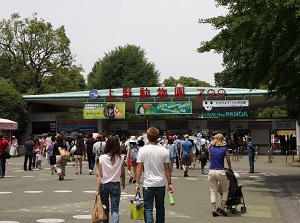
Entrance of Ueno Zoo
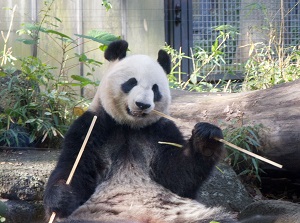
Giant panda in Ueno Zoo
Ueno Zoo is a popular zoo that over 4 million people visit for a year.
It is located to the north of Shinobazu-no-ike.
It has more than 450 different animals.
In 1972, the giant pandas were offered from China as the gift of normalization of diplomatic relations between Japan and China.
Since that, they had been the symbol of this zoo.
Buildings of former Kan-eiji temple
There are a few buildings of former Kan-eiji temple.
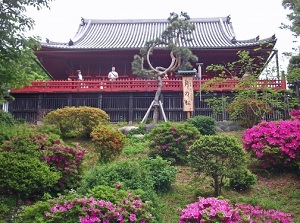
Kiyomizu Kan-nondo
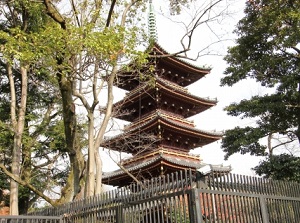
Five-story pagoda
Kiyomizu Kan-nondo (清水観音堂) is a Buddhist temple enshrining the Goddess of Kannon.
It is near the statue of Saigo Takamori.
It was built in 1631.
The building is not so large, but the form is similar to famous Kiyomizu-dera temple in Kyoto.
Five-story pagoda (五重塔) is located inside of Ueno Zoo at the north part of the park.
It was built in 1639, and was repaired in 2014.
Originally, four statues of Buddha were enshrined in the pagoda, but they have been moved to Tokyo National Museum.
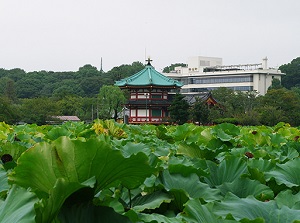
Bentendo from Shinobazu-no-ike
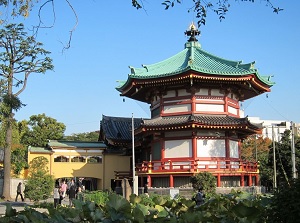
Bentendo
Bentendo (弁天堂) is a temple on an inland in Shinobazu-no-ike
It was built around the 1620s, as if a temple stands on a small island in Lake Biwa (Shiga Prefecture).
The original temple was destroyed by Tokyo air raids by US in 1945, but the current temple was rebuilt in 1958.
Ueno Toshogu shrine (上野東照宮)
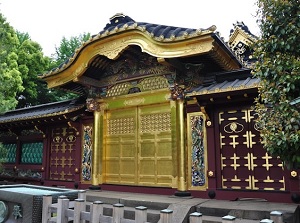
Karamon gate of Ueno Toshogu
Photo by Railstation.net
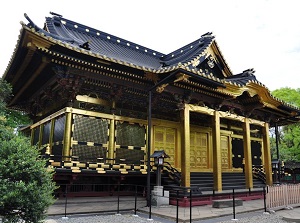
Main Shrine of Ueno Toshogu
Photo by Railstation.net
Ueno Toshogu is a Shinto shrine located at south part of the park and near Ueno Zoo.
It was built in 1627 according to the will of Tokugawa Ieyasu, the first Shogun of Edo government.
Ieyasu, Yoshimune (the 8th Shogun) and Yoshinobu (the 15th Shogun) have been enshrined.
And the main shrine was rebuilt in 1651, and was repaired in 2013.
The beautiful main shrine is surrounded with a fence, and a beautiful Karamon gate is just in front of the main shrine.
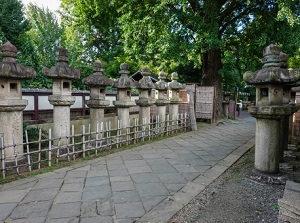
An approach of Ueno Toshogu
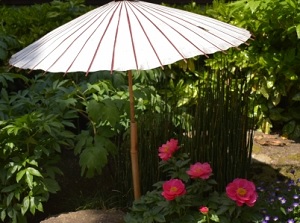
Peony garden of Ueno Toshogu
It has a peony garden in the precincts.
And there is a small fire continuing to burn in the precincts.
It is the fire from smoldering house in Hiroshima immediately after atomic bombing in 1945.
Museums around Ueno Park
The northeast half of the park is on a low terrace, and there are some cultural facilities.
Especially, there are a few major museums in this area.
How to get here
- Get off at Ueno station (JR Yamanote or Keihin-Tohoku Line), or Keisei -Ueno station (Keisei Line)
-
Nearest stations of subway.
Ueno-Okachimachi (●E09 Ooedo Line)
Ueno-Hirokoji (●G15 Ginza Line)
Ueno (●G16 Ginza Line, ●H18 Hibiya Line)

